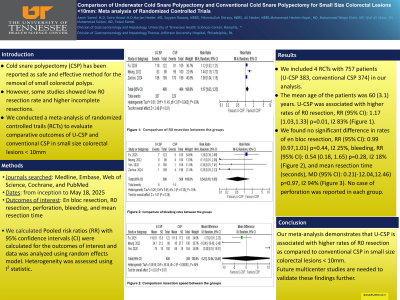Sunday Poster Session
Category: Colon
P0301 - Comparison of Underwater Cold Snare Polypectomy and Conventional Cold Snare Polypectomy for Small Size Colorectal Lesions <10mm: Meta-Analysis of Randomized Controlled Trials


Aamir Saeed, MD
Vanderbilt University Medical Center
Memphis, TN
Presenting Author(s)
1Vanderbilt University Medical Center, Nashville, TN; 2Trinity Health Ann Arbor Hospital, Ypsilanti, MI; 3Combined Military Hospital, Rawalkot, Rawalkot, Azad Kashmir, Pakistan; 4Services Hospital , Lahore, Lahore, Punjab, Pakistan; 5Nishtar Medical University, Multan, Multan, Punjab, Pakistan; 6United Health Services, Binghamton, NY; 7Brigham and Women's Hospital, Harvard Medical School, Boston, MA; 8West Virginia University School of Medicine, Morgantown, WV; 9University of Oklahoma, Oklahoma City, OK; 10University of Pittsburgh Medical Center, Pittsburgh, PA; 11Sidney Kimmel Medical College at Thomas Jefferson University, Philadelphia, PA
Introduction:
Cold snare polypectomy (CSP) has been reported as safe and effective method for the removal of small colorectal polyps. However, some studies showed low R0 resection rate and higher incomplete resections. Underwater cold snare polypectomy (U-CSP) is a novel technique. We conducted a meta-analysis of randomized controlled trails (RCTs) to evaluate comparative outcomes of U-CSP and conventional CSP in small size colorectal lesions < 10mm.
Methods:
Several databases were reviewed from inception to May 18, 2025, to identify RCTs comparing the outcomes of U-CSP vs conventional CSP in small colorectal lesions. Our outcomes of interest were en bloc resection, R0 resection, perforation, bleeding, and mean resection time. We calculated risk ratios (RRs) with 95% CI for categorical variables and mean differences with 95% CI for continuous variables. Data was analyzed using the random effect model. Heterogeneity was assessed using I 2 statistics.
Results:
We included 4 RCTs with 757 patients (U-CSP 383, conventional CSP 374) in our analysis. The mean age of the patients was 60 (3.1) years. U-CSP was associated with higher rates of R0 resection, RR (95% CI): 1.17 (1.03,1.33) p=0.01, I2 83% (Figure 1). We found no significant difference in rates of en bloc resection, RR (95% CI): 0.99 (0.97,1.01) p=0.44, I2 25%, bleeding, RR (95% CI): 0.54 (0.18, 1.65) p=0.28, I2 18% (Figure 2), and mean resection time (seconds), MD (95% CI): 0.21(-12.04,12.46) p=0.97, I2 94%. No case of perforation was reported in each group.
Discussion:
Our meta-analysis demonstrates that U-CSP is associated with higher rates of R0 resection as compared to conventional CSP in small size colorectal lesions < 10mm. Future multicenter studies are needed to validate these findings further.


Disclosures:
Aamir Saeed, MD1, Saira Yousuf, MD1, Marjan Haider, MD2, Sayyam Razzaq, MBBS3, Hikmatullah Shirzoy, MBBS4, Ali Haider, MBBS5, Muhammad Abdul Basit, MD6, Muhammad Hashim Hayat, MD7, Muhammad Waqar Elahi, MD8, Ijlal Akbar. Ali, MD9, Sultan Mahmood, MD10, Faisal Kamal, MD11. P0301 - Comparison of Underwater Cold Snare Polypectomy and Conventional Cold Snare Polypectomy for Small Size Colorectal Lesions <10mm: Meta-Analysis of Randomized Controlled Trials, ACG 2025 Annual Scientific Meeting Abstracts. Phoenix, AZ: American College of Gastroenterology.
